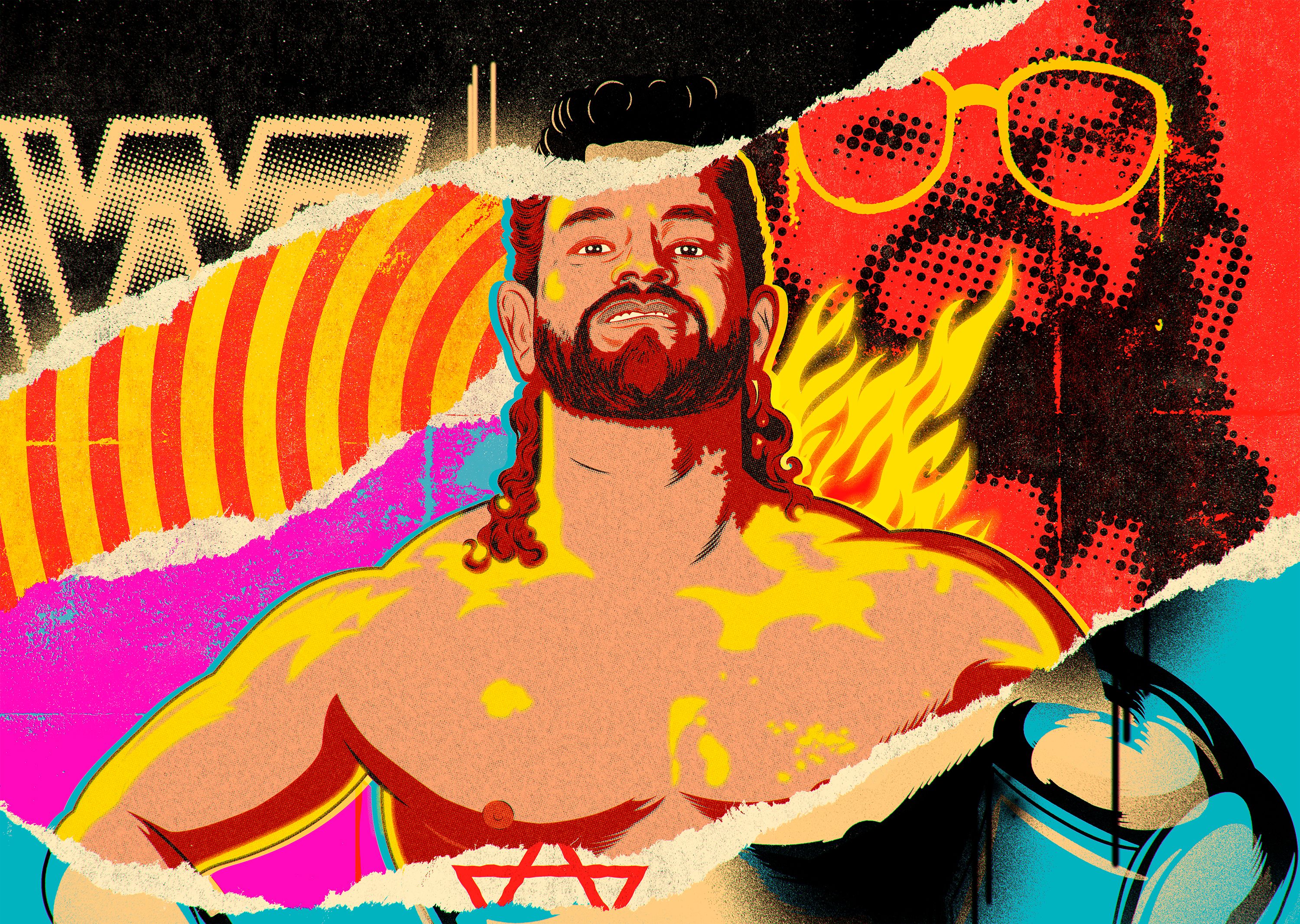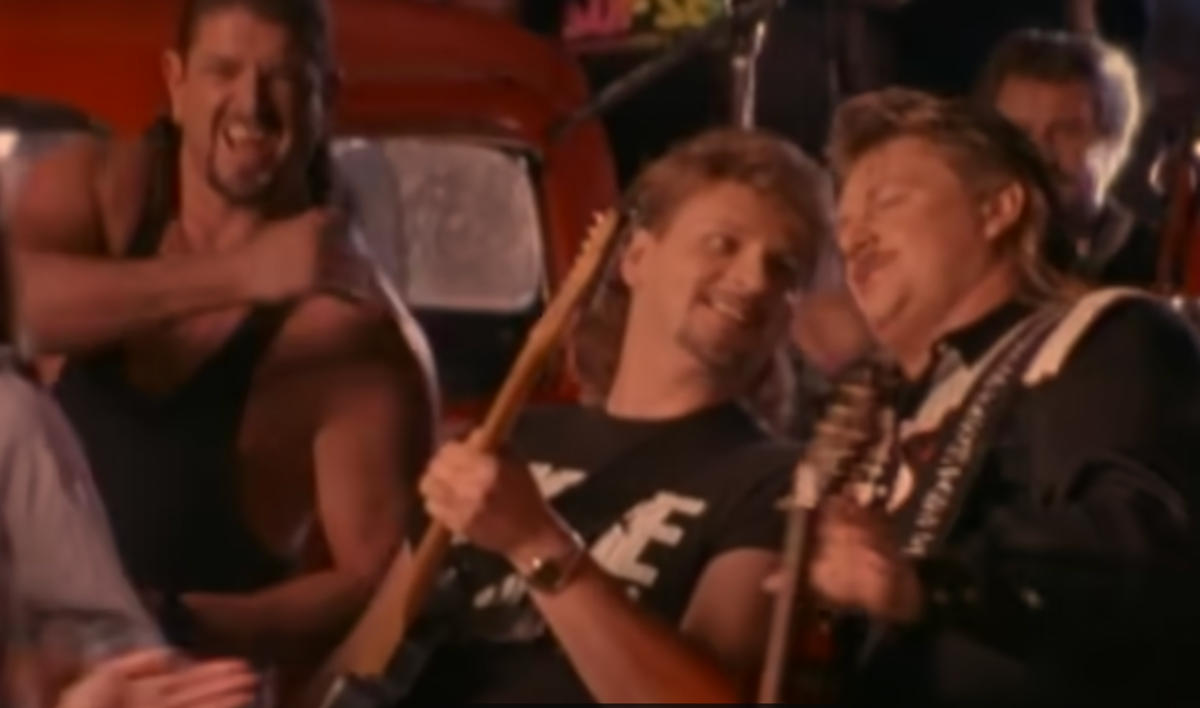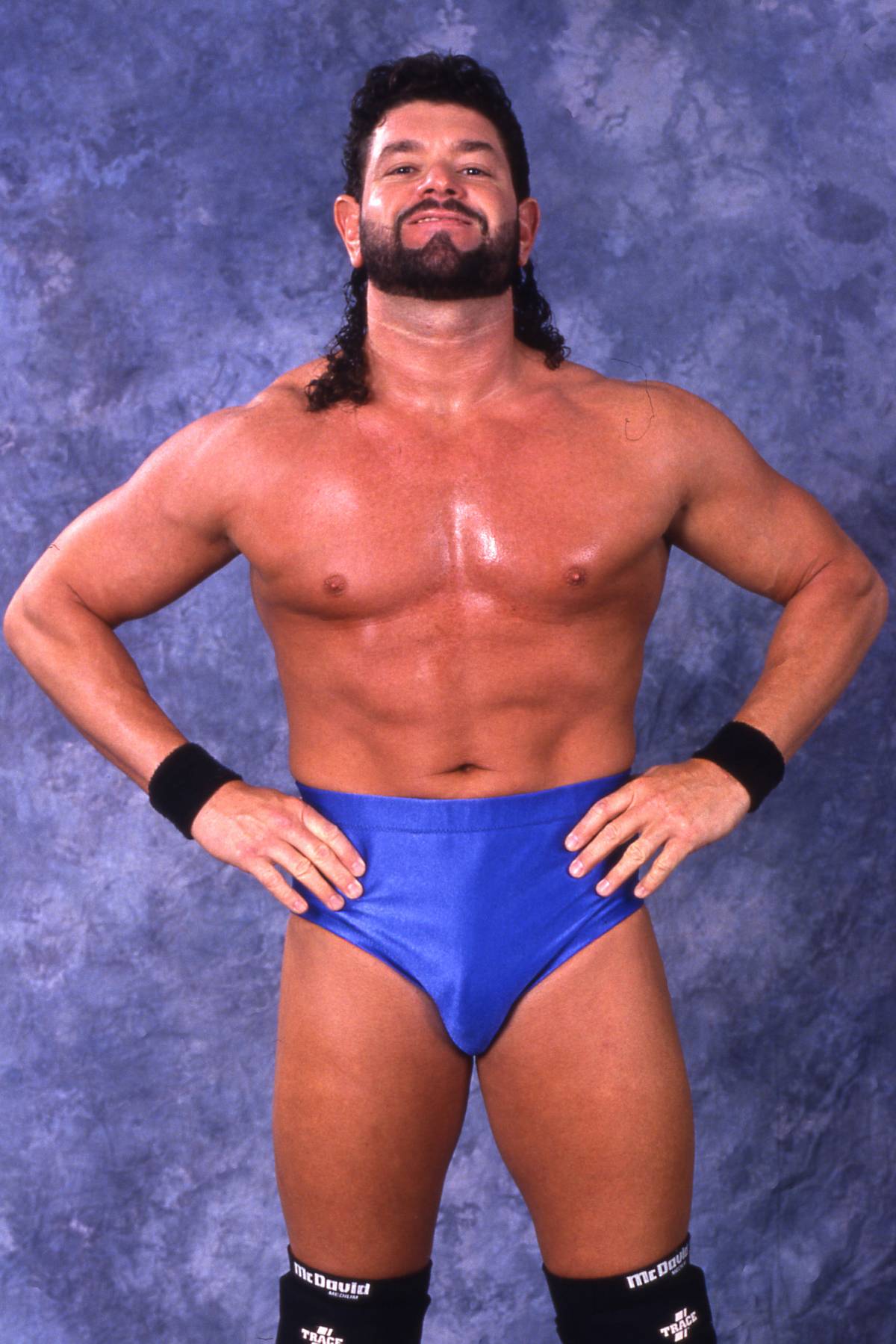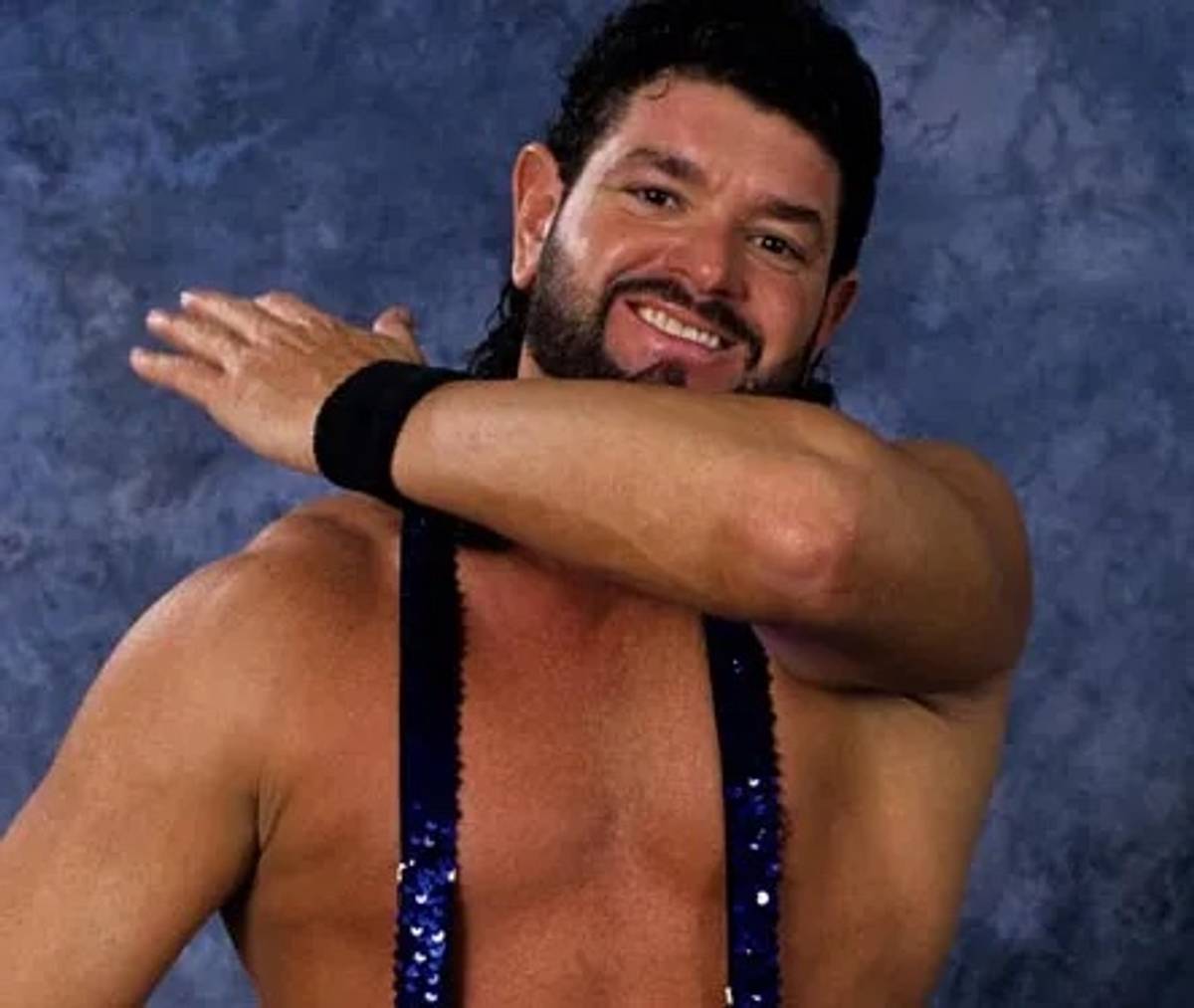Barry Horowitz Pats Himself on the Back
Pro wrestling’s most outwardly Jewish performer on his legacy, jabronis, and rules for life



“He says he’s never heard of you,” the Albany, New York, convention promoter told me as I waited in the doorway to the meet and greet. I stood there stunned. I believed I had been Facebook messaging with the quasi-retired wrestler Barry Horowitz—I later found out it was his booking agent who never relayed my messages. I also shot him several emails after a mutual acquaintance slid me his email, but they all went unanswered. “You don’t just hand out someone’s email,” Horowitz said, striding toward me with a stern look on his face. “It’s not right.”
There it was: I’d broken one of Horowitz’s rules.
If you watched pro wrestling during the late ’80s and ’90s, you knew Horowitz as the enhancement talent who loved patting himself on the back. He was clotheslined. He was body-slammed. He was pile-driven through the mat, often getting pinned in less than three minutes and making his opponents look like Greek gods. He also was professional wrestling’s most outwardly Jewish performer, never afraid to hide his heritage, parading to the ring to “Hava Nagilah” and rocking a Star of David on his trunks.
I quickly apologized for accepting the email address, and I listened as Horowitz explained the numerous times people—especially promotors—had lied and taken advantage of him. “They’re jabronis,” he said, dropping a version of the term jobber, a derogatory word often used for performers whose job it was to lose matches. It was a term that has often been weaponized against himself. “They’re unprofessional. In any other business they wouldn’t get away with it. They couldn’t keep a job at Walmart.”
Because people had wronged him in the past, he’d established rules. One was that people needed to value his time, meaning that if someone wanted to interview him, he better be paid. I explained how doing press gave him publicity and that was something that he could benefit from. I laid out my goals for the piece and the rules I had as a journalist: I could not pay for interviews.
“I don’t need publicity,” he snapped back, then listed his prices: $50 for a half hour; $100 for an hour. He wasn’t asking for much, and I realized that the payment was about showing respect. “I really want to help you out,” I said. “I get it. I do. But in journalism, there are rules,” I paused to think, hoping when I didn’t budge, he’d change his mind. “Let me talk to my editor,” I finally said, feeling no choice but to give in. “I’ll see what I can do.”
A slight smile appeared across his face. “I can already tell you are professional,” he said. “Unlike those other guys.” He offered me a fist bump.
Over the next week and a half, we called each other numerous times, each conversation lasting 10 to 15 minutes. There still seemed to be rules: I couldn’t hit record and couldn’t ask questions, but still Horowitz would go on about his own subjects, running the gamut of emotions; one moment he’d be angry, discussing his past experiences with “jabroni” promoters, the next he’d be thankful and happy, talking about how professional I was. He seemed honored when I told him about peers in the industry who wanted to talk to me about how great he was to work with and how much he helped them. One night, he called me sounding distraught, explaining he was giving me a definitive no to the interview: Too many people had taken advantage of him. Then I came up with a solution that met both our needs: I wouldn’t pay Horowitz for an interview, but I’d purchase a few of his T-shirts for Tablet staff.
“One of my favorite words is compromise,” he told me when we Zoomed. “I wanted this [interview] to come true.”
Mother’s Day is not the best day to hold a wrestling convention. But hidden deep within the maze of Albany, New York’s Crown Plaza hotel corridors was a room circled with tables and wrestlers ready to sign. And even though there were often more wrestlers than fans, the event looked nothing like the tragic signing scene from the 2008 film The Wrestler, with broken-down wrestlers passed out atop stacks of 8-by-10s. Instead, it felt more like a reunion of best buddies gathered together, sharing stories and belting out their theme songs. Sitting in the table directly in the rear of the room was Horowitz, the man who made the careers of nearly every performer in attendance—by losing to them.

The convention took place two months after Horowitz’s first match in 16 years, which he won in a street fight at the age of 62. Though he has ditched his signature mullet and his beard is a bit grizzled, he’s still in shape, and looks ready to go.
The self-deemed “Mr. Technical” wrestled most of his early career as a heel, a bad guy, who could rake an opponent’s eyes, grab a joint, twist, and stretch them until they screamed. But when Horowitz’s career peaked in the World Wrestling Federation (WWF, now World Wrestling Entertainment, WWE) in 1995, he became the ultimate fan favorite, the underdog who finally won, and his gimmick changed to being the Jew.
Other than during his youth, Horowitz has never been a practicing Jew, though he is proud to light a menorah from Israel every Chanukah. He isn’t a fan of gefilte fish, but says he’s never tasted anything like his mother’s matzo brei. He loves country music and Southern living and even appeared in the video for Joe Diffie’s monster hit Pickup Man. His favorite song is The Climb by Miley Cyrus. Horowitz is in many ways representative of many modern Jews, not because he fits a monolithic image of what defines a Jew, but specifically because he doesn’t.
“It’s all about paying your dues in my world. It’s the climb,” Horowitz told me via Zoom. “I just want to strive always.”
The grandson of a tailor, Horowitz spent most of his youth living in St. Petersburg, Florida, with parents who spoke Yiddish fluently. His father worked for a time as a bus driver, a postal worker, and a prizefighter, making the cover of The Ring magazine. Though Horowitz was never bar mitzvahed, he grew up in a conservative household and he credits his faith, with its values and rules, with influencing his current state of mind. “I think it helped build character and molded me,” he said.
Horowitz has a litany of rules he established for himself and the world that undoubtably lengthened his career and life while other superstars were swallowed by pills and steroids. Always show up on time, early even. Don’t share people’s emails without asking first. Be honest. Don’t “work a worker.” Don’t promise someone money and stiff them. “Live in the right lane, not the rock star lane.” Don’t do drugs; don’t drink too much. Saturday is Barry’s cheat day, when he allows himself two light beers, three max. Always at home. Won’t touch vodka.
Horowitz first fell for pro wrestling in his early teens, when he flicked on channel 44, WTOG, and witnessed Thunderbolt Patterson going to war with Mr. Clean for Championship Wrestling from Florida. From there, he made it his mission to succeed in the squared circle, looking to amateur wrestling to develop his skills. He wrestled at the local youth center, in junior high, in high school, and at Florida State University, where he studied business administration and sports nutrition for a year before dropping out to follow his dream. “I thought it was part of the climb,” he said.
His parents supported him the entire time. “My mother was fine with it. My father wasn’t too sure how that would work out for me, but then when I was progressing, he was very proud of me. And he told me that.”

For a year and a half, Horowitz trained under the tutelage of wrestling legend “Professor” Boris Malenko, real name Lawrence Simon. Though they both connected as Jews, Horowitz says their relationship “was all business. … It was about being a pro wrestler and getting it done right. No time for haha and gaga.”
After debuting in 1979, Horowitz spent eight years performing across the United States, in Canada, and in Puerto Rico, during a period in which loosely affiliated regional promoters carved out sections of territory to call their own. Horowitz was promoted as a star. In one of the largest territories, Championship Wrestling from Florida, he was given a losing streak gimmick that flipped into him holding the heavyweight championship.
When Horowitz received the call to join Vince McMahon’s nationwide promotion WWF in 1987, he jumped at the opportunity to make four times the amount he made in the smaller territories. But in the WWF, where muscle mass meant everything and much of the roster was on steroids, he was smaller than most of his peers, so he was quickly slotted into the role that defined his career. He was an enhancer—making other wrestlers look amazing.
For most of Horowitz’s time in the territories he had wrestled with the last name Hart, based on a recommendation by his trainer Malenko. But when he entered the WWF, McMahon changed it because he already had future WWF champion Bret Hart on the roster. McMahon felt Horowitz, his real surname, was the perfect last name, Horowitz remembers, because “it would get more heat,” the wrestling term for popping a negative reaction from the crowd. While some fans found it questionable to have a performer—especially one who is known for losing—take on a gimmick whose main quality is being Jewish, Horowitz says he “thought it was awesome.”
“A ‘jobber,’ if you want to use that word, is a guy who is only in it for a buck, he goes to the gym every now and then, doesn’t have the ring gear, doesn’t know the business that well,” Horowitz said in his WWE.com Where Are They Now? “You just get your butt pounded on TV and that’s it—but that wasn’t me. I knew this business, I knew what my position was—and I went out there and gave all I had, and to see it pay off was incredible.”
In wrestling, there’s a winner and a loser. Horowitz had spent his WWF career playing the latter. His magic was that every time he was in the ring, even though you knew he was getting pinned, you believed he truly thought he could outmaneuver his opponents. “To create the Batman, you need a good Joker,” said former WWF Intercontinental Champion and Tag Team Champion Jacques Rougeau. “Barry Horowitz was a good Joker. He created so many Batmans that are in the [WWE] Hall of Fame today.”
During his run in the WWF, he put over a who’s who of superstars including Dusty Rhodes, Jake Roberts, Mick Foley, Steve Austin, and Shawn Michaels. He was an artist who knew how to tell a story in his matches, taunting opponents, and then popping the crowd by patting himself on the back.
In the summer of 1995, backstage at the Wilkes-Barre, Pennsylvania, Marts Center, Horowitz was pulled aside by then WWF champion, Diesel, aka Kevin Nash, who told him, “You know, you’re gonna win tonight.” Horowitz was trained that if someone played a joke on you, you lean into it and play along. So when Diesel told him he was going to pin the late Chris Candido, Horowitz made believe he believed him. But Diesel wasn’t joking.
In a match that aired on Wrestling Challenge, Horowitz swooped Candido into a 3/4 nelson grapevine, scoring the three count. The crowd roared—half with smiles plastered across their faces, half with jaws dropped—while Horowitz leapt around the ring, beaming.
“Barry Horowitz has just won his first match,” the commentator, Jim Ross, bellowed to the universe.
Horowitz was now a superstar, and with status he was given his own entrance music. No one told him they were using “Hava Nagilla” as his tune, he told me. “It was just played, and [someone said] ‘Hey, your music’s on, bro.’ I guess that I wasn’t important enough to explain it to.” But he liked it. “It matched my gimmick. … It was different. People could relate to it. It’s a catchy little tune there.”
Horowitz says he’s never dealt with antisemitism in the industry, just some good-natured joking. “I think Vince actually had a bunch of Jewish employees working for him,” he told me, referencing office staff and the ring announcer and WWE Hall of Famer, Howard Finkle. “He’s always loved the Jews and Samoans.”
But wrestling journalist Dave Meltzer said, “Most of the Jewish wrestlers didn’t really portray being Jewish.” One of the more iconic Jewish performers during the ’90s and ’00s, Raven, real name Scott Levy, was adamant about not being depicted as a member of the tribe because he felt it would affect his career negatively, possibly because of “the idea that Jewish people weren’t good at sports.”
Commentators made jokes about Horowitz eating gefilte fish for Thanksgiving and wearing a “yakuma.” In one match, commentator Jerry Lawler said, directly to his co-commentator, then WWF owner Vince McMahon, “Y’know McMahon, Barry Horowitz’s grandparents were on Schindler’s list.” But Horowitz loved the Jewish gimmick, adding a Star of David to his blue trunks on a suggestion from Chief Jay Strongbow, an Italian American WWE Hall of Famer who used a Native American gimmick, headdress and all.

Horowitz’s run in the spotlight lasted about a year, performing at nearly every pay per view including the Royal Rumble and SummerSlam, playing in celebrity softball games, appearing in Karate Fighters commercials. But by 1997, his character had grown into being portrayed as a nerd, wearing horn-rimmed glasses and button-down shirts with pocket protectors, and he was back to playing the role of enhancer.
“He got pigeonholed in that role of always putting guys over on WWF TV because he was so good. He was so fucking good,” said former booker, promoter, and manager Jim Cornette on his podcast Jim Cornette’s Drive Thru. “… But unfortunately, it kind of typecast him.”
By the early aughts, after the wrestling industry had crashed following the late ’90’s high, Horowitz had tired of the road, so he settled into a day job, working 12 years as a certified sports nutritionist. He enjoyed time with his family, eating out, running errands, and listening to country music. He supported his wife as she transitioned from a career as a banker to owning her own cleaning business, and watched his son, now 28, flirt with amateur wrestling and find his own path as a creative behind a camera. Horowitz still trained six days a week, still attended meet and greets, and still enjoyed watching wrestling to study the art form, although he couldn’t get into “circus matches,” with more unnecessary over-the-top moves than storytelling.
What brought him back? It was simple, his phone rang and the promoter pitched him a good story. Horowitz weighed the risk, realizing that getting injured would cause him to cancel appearances, but the match seemed cool and Horowitz saw a chance to make another superstar. So on March 19, 2022, at 62 years old, Horowitz met indie darling Joey Janela, 32, in a New Jersey Street Fight for WrestlePro.
“Mr. Technical is Mr. F. You Up,” Horowitz said before the bell rang, and the match ran nearly a half hour, featuring a trash can, a ladder, and a toaster. (“Was that a kosher toaster?” screamed Janela.) Horowitz was put through a table and a door. Janela attempted to crown Horowitz with a folding chair, but Horowitz weaved, causing Janela to bonk the ropes with the furniture, deflecting it into his own face.
“Barry Horowitz is going to dance the hora back to the locker room with a big ass W,” the commentator shouted after Horowitz covered his opponent, scoring the pin.
“Personally, I think Barry Horowitz should be in the [WWE] Hall of Fame …” said Bret Hart at a virtual signing for Highspots. “Barry Horowitz was a really good wrestler. Never hurt anybody—ever—was always a pro in there every night. That’s a guy that should be in the Hall of Fame.”
In a sport where Jewish performers hid their heritage, Horowitz showed future superstars that they could be proud of it. “I still use his self-pat on the back sometimes to get heat,” said Israeli Canadian wrestler Tomer Shalom. Shalom, who also wears a Magen David on his gear, saw the symbol on Horowitz’s trunks and believed he was Israeli. His dream match is facing Horowitz in the ring.
“I believe that had he come 10 years earlier, he probably would have been a very solid, good wrestler, who would have done reasonably well in a lot of places,” said Meltzer. But Horowitz came during the era when McMahon wanted ginormous-muscled megastars. “If he came now, size isn’t as big of an issue, there’s more of an emphasis on working. It would have been up to his color.”
Horowitz isn’t done yet. “I think I’m always still climbing,” he said. He’ll “pick and choose” future matches “if the finances are right and the opponent’s right,” and he hopes to retire over the next year or two in Nashville, Tennessee, which he calls his “second home.” He wants to pass on his knowledge, and would love to train the next generation of superstars for one the current big three feds, WWF, All Elite Wrestling (AEW), or Impact.
On the May 19, 2022, episode of AEW: Dynamite, Horowitz made a surprise appearance in a parody of the VICE TV docuseries Dark Side of the Ring. Dressed in a Starter T-shirt, he looking like he was ready to hit the gym—or to stretch an opponent. His script was written by current megastar Maxwell Jacob Friedman, a cocky Burberry-ed out ultraheel who often incorporates his heritage into his character, defining his Judaism on his own terms. As Horowitz performed his promo, putting over numerous current stars, a title appeared beneath him: Barry Horowitz, Legendary Jewish Wrestler.
Jay Deitcher is a writer and clinical social worker from Albany, New York.